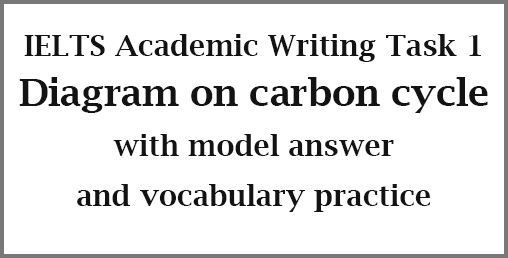IELTS Academic Writing Task 1: Cycle diagram on movement on carbon on the earth; with model answer and vocabulary practice
In this Academic IELTS Writing Task 1 post we are discussing another cycle diagram related to the environment or atmosphere. You will find a great model answer to a cycle diagram which shows how carbon moves on and around the atmosphere. You will also get a short vocabulary practice on the model answer.

Let’s take a look at the question.
The diagram shows the movement of carbon on and around the atmosphere.

Model answer:
The illustrated diagram is a clear presentation of how carbon moves on and around the Earth’s atmosphere. Overall, the diagram indicates that carbon movement on the earth is an ongoing process that includes both natural and man-made practices.
As is shown in the diagram, carbon-di-oxide or CO2 gas is one of the main sources of carbon in our environment and it is created due to two major exercises. The natural exercise includes both plants and animals. Using the sunlight plants produce food through photosynthesis reaction which creates CO2. Plants also release CO2 gas and carbon in the atmosphere and below the surface through respiration. Animal respiration also contributes by discharging carbon dioxide into the atmosphere which comes back to the surface with rainfall. Carbon is also discharged on the surface level and absorbed by water owing to the death of organisms and wastes as well as fossils and fossil fuels beneath the ground.
The other one is the man-made exercise which includes factory wastes and emissions and exhaust release which are responsible for a large amount of carbon-di-oxide discharge on the environment.
(175 words)
Learning vocabulary is an integral part of IELTS Writing. Here is a list of vocabulary with an explanation from the above model answer. Try to practice them by learning the meaning and then making sentences with them.
Vocabulary from the model answer:
Illustrated (adj.) – described, explained, exemplified, shown, given,
Presentation (n.) – demonstration, demo, illustration,
Atmosphere (n.) – air, environment,
Overall (adj.) – in general, on the whole, mostly,
Indicate (v.) – show, point out,
Ongoing (adj.) – continuous, constant, nonstop,
Practice (n.) – exercise,
Source (n.) – basis, foundation,
Photosynthesis (n.) – a process by which green plants and other organisms turn carbon dioxide and water into carbohydrates and oxygen, using light energy trapped by chlorophyll
Reaction (n.) – response, reply, rejoinder,
Release (v.) – discharge, ejection,
Surface (n.) – the outside part or uppermost layer of something, exterior,
Respiration (n.) – breathing, inhalation,
Contribute (v.) – help to cause something, bring about,
Owing to (adj. phrase) – because of or on account of
Organism (n.) – an individual animal, plant, or single-celled life form
Fossil (n.) – the remains or impression of a prehistoric plant or animal embedded in rock and preserved in petrified form
Beneath (prep.) – at a lower level
Man-made (adj.) – made or caused by human beings (as opposed to occurring or being made naturally)
Waste (n.) – leftover, garbage,
Absorb (v.) – take in or soak up (energy or a liquid or other substance) by chemical or physical action
Emission (n.) – release, secretion, production and discharge of something, especially gas or radiation
Exhaust (n.) – waste gases or air expelled from an engine, turbine, or another machine in the course of its operation
Responsible (adj.) – accountable, liable, blamed,
Now, you can make some sentences with these words which will help you increase your vocabulary stock.
Here are some other Task 1 samples and answers for you:
Process diagram on electricity generation from solar panels
Process diagram on apple juice production
Flow-chart on sweater manufacturing
Process diagram on olive oil production
Two maps showing changes in an industrial village
Two maps showing changes in a town
Life cycle diagram on tuna fish
Life cycle diagram on silkworm moth
Cycle diagram on water movement
Process diagram on sugar production




One thought on “IELTS Academic Writing Task 1: Cycle diagram on movement on carbon on the earth; with model answer and vocabulary practice”